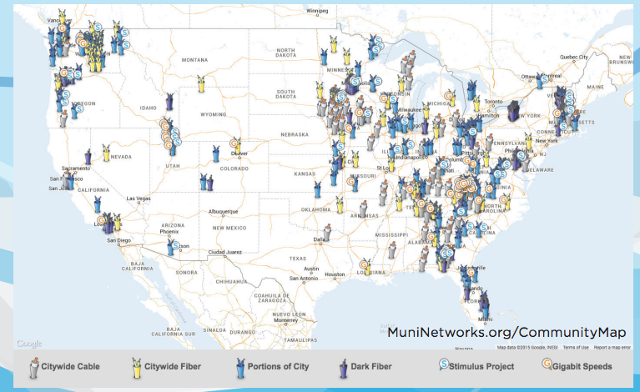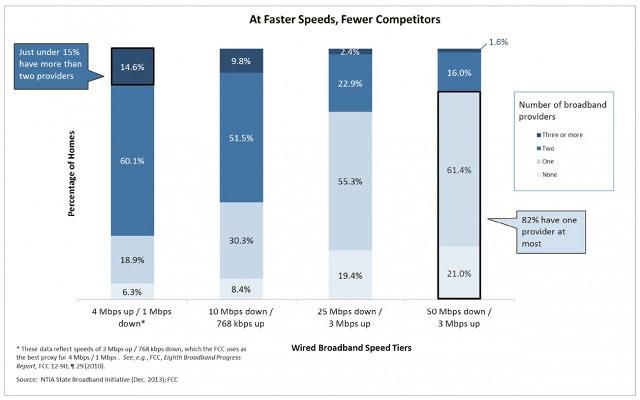With Internet connections orders of magnitude faster than are available in many larger American cities, Chattanooga's public fiber optic broadband network has been the subject of press coverage and an object of envy around the world.
But as the city's Electric Power Board, which operates the network, has sought to expand broadband coverage across its region of Tennessee, it's run into opposition from a surprising source: state lawmakers, who, under pressure from large private Internet providers, have barred local governments and public utilities from offering broadband outside the areas where they have traditionally sold electricity.
But on Thursday, the Federal Communications Commission voted 3-2 along party lines to override the state law, in order to level the competitive playing field between the city's municipal network and those of incumbent providers like Comcast and Verizon. The decision could lead to similar challenges in the roughly 19 states that limit local governments looking to set up broadband networks.
"The bottom line of these matters is that some states have created thickets of red tape designed to limit competition," FCC Chairman Tom Wheeler said, explaining his support for the ruling. "When local leaders have their hands tied by bureaucratic state red tape, local businesses and residents are the ones who suffer the consequences."
The FCC was ruling on petitions filed by officials in Chatanooga and Wilson, North Carolina, which operates a similar network. The commissioners voted on the ruling before a separate, landmark 3-2 vote, in which it ruled in favor of "net neutrality"— that Internet service providers would be treated as carriers under Title II of the Telecommunications Act, which regulates services as public utilities. (Verizon responded to what it called "badly antiquated regulations" with a press release that appeared to be written on a typewriter.)
The move is expected to set a precedent that would give customers more choice in an industry that is often criticized for lack of choice and poor service. More than half of Americans have only a single choice of Internet provider at speeds of 25 megabits per second, the basic threshold for high-speed Internet under a new FCC-approved definition.
While there is no "silver bullet for net neutrality," April Glaser and Corinne McSherry of the Electronic Frontier Foundation wrote in a recent essay, municipal broadband "can help promote competition by doing one essential thing: offering people real alternatives."
Christopher Mitchell, director of community broadband networks at the Institute for Local Self-Reliance, told Fast Company that the ruling over broadband could prove at least as important to promoting competition as the net neutrality decision.
"Preventing big Internet Service Providers from unfairly discriminating against content online is a victory, but allowing communities to be the owners and stewards of their own broadband networks is a watershed moment that will serve as a check against the worst abuses of the cable monopoly for decades to come," Mitchell wrote in an email.
Though the FCC said its decision is in line with a congressional mandate to "remove barriers to broadband investment and competition," the ruling could still face a challenge in federal court from state governments and telecom companies who've previously said such a ruling would exceed the commission's authority. States and telecom companies have promised to respond to the FCC's rulings today with litigation.

Competition Versus States Rights Claims
The ruling by the FCC's Democratic majority in favor of the power board and the city government of Wilson, N.C., which also says its plans to expand municipal broadband coverage have been curtailed by state law, comes after the White House formally came out against such laws last month, echoing widespread charges that the laws were passed largely at the behest of big cable and phone companies.
"Laws in 19 states—some specifically written by special interests trying to stifle new competitors—have held back broadband access and, with it, economic opportunity," says a January White House report that joined the cause to the Obama administration's push for net neutrality.
While Chattanooga's power board—along with the city government —argued Congress gave the FCC the authority to preempt the state law, telecommunications companies and state officials have said the states have the right to protect the broadband market from unfair competition by taxpayer-funded utilities and have ultimate authority, under the Constitution, to limit the powers of municipal governments.
"I want my state to compete in a 21st Century economy, and to do that, we need 21st Century infrastructure and technology—what we do not need is federal administrative intrusion into our state's business practices," wrote Gov. Nikki Haley of South Carolina, which also places limits on public broadband networks, in a letter to FCC Chairman Tom Wheeler. "As a matter of policy, South Carolinians believe that the private sector can provide higher quality, more sustainable broadband services with lower risk to the taxpayer than local governments."
Creating An Oasis For "Digital Deserts"
In Chattanooga, the city-owned utility initially planned its digital network as part its migration to "smart grid" technology, designed to let engineers track the status of the power network in real time. It ultimately used the same infrastructure to offer gigabit-per-second broadband to businesses and homes across the city, which it says helped the former industrial town perhaps still most closely associated with a 1940s Glenn Miller tune—"Chattanooga? As in, the Choo Choo?"asks a website touting the high-speed network—to attract new high-tech businesses and jobs.
But while Chattanooga and a few surrounding areas served by the city-owned utility have access to some of the fastest Internet speeds in the hemisphere, many surrounding communities are "in a digital desert" with little or no access to broadband service, according to a study cited by the Electric Power Board. The utility has said there's little it can do to help, as it was barred by state law from offering Internet access outside its electric coverage area.
Similarly, the Wilson, N.C., city government offers speedy fiber optic connections to residents of the onetime tobacco-trading hub but says a 2011 state law makes it effectively impossible for it to extend coverage to neighboring communities. Among other provisions, the law requires public broadband networks to prove that a high percentage of residents don't have access to other high-speed connections and charge no less than it would cost a private company to provide the service.
"Comments filed regarding Wilson's petition suggest that the law was largely sponsored and lobbied for by incumbent providers and competitors to Wilson," according to an FCC statement released after the commission voted to preempt the law.
Pushback From Big Telecom
Telecom companies have said such laws make it impossible for them to afford to offer broadband services, particularly in less lucrative markets: the Tennessee Telecommunications Association, a group of small telecom companies in the state, expressed its concern last year when legislators drafted proposals to ease the state's restrictions on municipal broadband expansion.
"These bills would allow municipalities to expand beyond their current footprint and offer broadband in our service areas," said Levoy Knowles, the group's executive director, in a statement. "If this were to happen, municipalities could cherry-pick our more populated areas, leaving the more remote, rural consumers to bear the high cost of delivering broadband to these less populated regions."
And USTelecom, an industry group, has previously told the FCC that such a ruling would be an unconstitutional interference with states' rights, potentially setting the stage for a legal challenge to the new ruling.
Mitchell, of the Institute for Local Self-Reliance, says he expects to see a federal appeals court challenge to the ruling filed in the near future.
"It may be telecom companies, it may be the National Conference of State Legislators, or it could be a collection of state attorneys general," he says.
The ruling may also spur an effort in Congress to curtail the FCC's authority, with Republican U.S. Rep. Marsha Blackburn, of Tennessee, having previously pushed federal legislation to limit the commission's jurisdiction over state-regulated municipal broadband projects.
"We don't need unelected bureaucrats in Washington telling our states what they can and can't do with respect to protecting their limited taxpayer dollars and private enterprises," Blackburn said in a June statement.
Among the few telecom companies to back municipal networks in a letter to the FCC was Utah-based Internet service provider XMission.
"Allow municipalities to dictate their own data futures by allowing them to build open municipal data infrastructures," wrote Pete Ashdown, the company's president. "Open data infrastructures held by a government or regulated entity is the only way to ensure robust data competition without unfair competitive practices."
XMission provides service through a multi-city public fiber network called UTOPIA. Unlike in Chattanooga and other cities where a public utility operates the physical fiber lines and provides service, the multi-city agency provides the physical network and leases access to multiple ISPs, which Ashdown says ensures consumers see the benefit of competition.
"There are over a dozen other Internet service providers on that network that any of our customers could switch to tomorrow," he says.

Municipal Internet proponents, including the Obama administration, say evidence shows increased competition in the broadband market often results in lower prices and faster downloads for Internet consumers.
"When Google announced that Google Fiber was coming to Kansas, speeds on existing networks surged 97 percent—the largest year-over-year jump in bandwidth observed in any state, ever," according to the White House report. "Likewise, when Google indicated that it would begin offering extremely fast connection speeds in Austin, TX, AT&T responded by announcing its own gigabit network."
And in Chattanooga, the Times Free Pressreported last year that the power board's network "poached tens of thousands of paying customers" from existing provider Comcast, which still provides cable and Internet service in the area.
Earlier this month, the president of the National Cable and Telecommunications Association, the lobbyist for telecom companies, said it was "highly likely" that it would fight the FCC's rulings in court, alongside legislators in North Carolina and Tennessee.